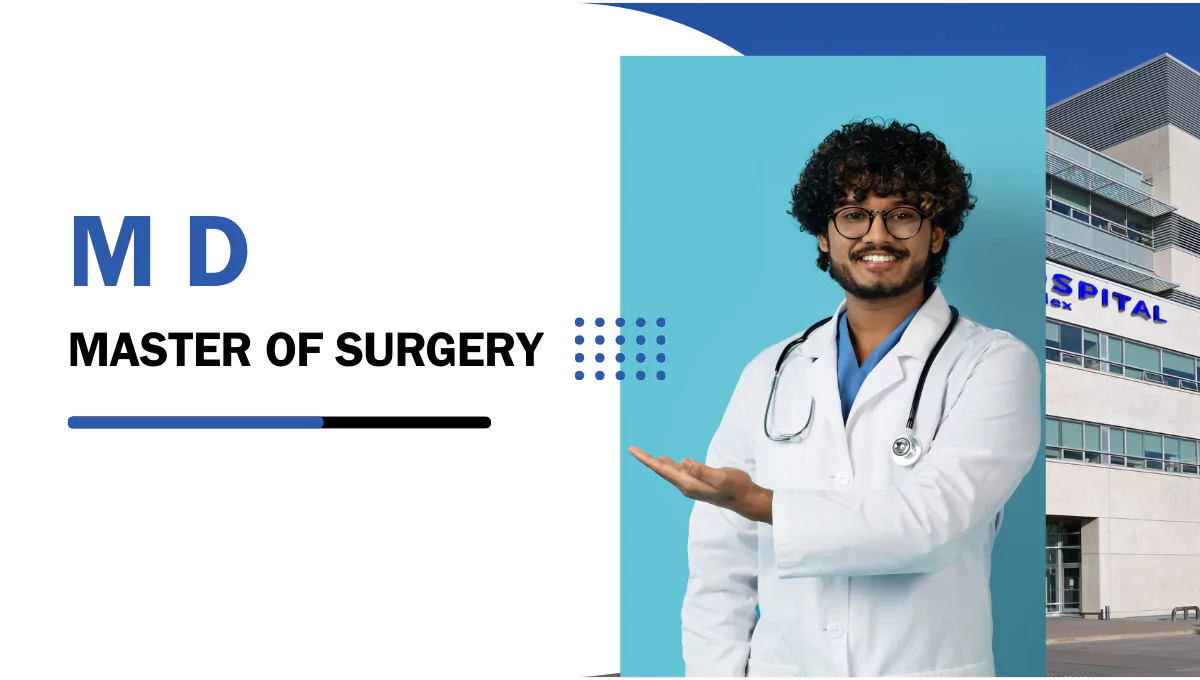The Master of Surgery (MS) degree is a prestigious postgraduate program in India, designed to provide in-depth knowledge and hands-on training in various surgical disciplines. This advanced course equips students with the essential skills required to excel in the field of surgery, combining theoretical education with practical experience. It is ideal for those who aspire to become proficient surgeons and pursue a career in specialized areas of medical surgery.
India boasts approximately 585 colleges that offer the Master of Surgery program, catering to a diverse range of medical students. Out of these, 320 are private colleges, while 265 are government institutions. This distribution allows students from various backgrounds to access surgical education across the country, with numerous opportunities in both private and public sectors.
In terms of career opportunities, graduates of the MS program are highly sought after in the healthcare industry. The 2021-22 placement report from AIIMS Delhi highlights the successful career paths of many MS graduates. During this period, 305 students from the 3-year postgraduate program were placed, reflecting the high employability of students from this course.
Salary packages for MS graduates can be quite lucrative, depending on the institution and the field of specialization. According to the 2021-22 placement data, institutions like CMC Vellore and JIPMER Puducherry reported impressive median salary packages for their MS graduates. The median salary at CMC Vellore for the 3-year PG courses stood at around Rs 10 lakh per annum (LPA), while at JIPMER Puducherry, the figure was notably higher, with graduates earning a median package of around Rs 24 LPA.
This data emphasizes the significant demand for skilled surgeons and the rewarding career prospects that await those who successfully complete the MS program. From government hospitals to private healthcare institutions, MS graduates can expect a variety of opportunities, both in India and abroad, contributing to the ever-growing field of medical surgery.
What is the Full Form of MS?
The full form of MS is Master of Surgery. It is a three-year postgraduate medical degree program designed for students who wish to specialize in surgery. After completing an MBBS degree, students can pursue the MS program to gain advanced training in surgical techniques and specialize in a specific branch of medicine. This course equips medical graduates with the expertise required to become skilled surgeons and excel in various surgical fields, such as general surgery, orthopedic surgery, neurosurgery, and more.
Highlights – MS (Master of Surgery)
| Details | Particulars |
| Course Name | Master of Surgery |
| Abbreviation | MS |
| Type | Degree |
| Level | Postgraduate |
| Field | Healthcare |
| Eligibility | MBBS |
| Duration | Three years |
| Average Fee | Rs. 2,000 to Rs. 1.8 Crore |
| Average Salary | Rs. 700,000 per annum and above |
| Career Opportunities | General Surgeon, Neurosurgeon, ENT Surgeon, Gynaecologist |
| Top Recruiters | Apollo Group, Indian Nursing Council, Fortis Hospitals, Manipal Group and Medica |
Note:-For more details on the Top 10 Medical Courses in India, click here
MS (Master of Surgery) Fee Structure
The fee structure for the Master of Surgery (MS) program varies significantly depending on the medical college or university. Different institutions have their own fee policies based on factors like reputation, location, facilities, and whether the college is government or private. Before applying, it’s important for students to thoroughly check the fee structure of the institutions they are interested in, ensuring it aligns with their financial capacity.
In India, the fees for MS courses can range widely—from as low as Rs. 2,000 in government colleges to as high as Rs. 1.8 crore in some prestigious private institutions. Government medical colleges generally have lower tuition fees compared to private colleges, which tend to be significantly more expensive due to the quality of facilities and advanced training they offer.
Why Choose MS?
Pursuing a Master of Surgery (MS) degree comes with several benefits that go beyond just academic knowledge. One of the primary advantages is the acquisition of exceptional ward management and postoperative management skills, both of which are essential for a successful surgical career. The program provides a comprehensive and in-depth understanding of the specific surgical specialization chosen by the student, preparing them for the challenges they will face in real-world surgery.
The MS program is designed to train students in performing surgical procedures with precision and expertise. The curriculum combines theoretical education with hands-on clinical experience, ensuring that graduates are well-prepared to handle complex surgical cases. This advanced level of training not only enhances their medical knowledge but also boosts their confidence in managing critical situations.
After completing the MS program, graduates have a wide range of career options. They can work as surgeons in various settings, including public and private hospitals, military hospitals, and healthcare institutions across the country. The medical field is vast, offering numerous opportunities for specialization and career growth. Surgeons with an MS degree are highly valued, both in India and internationally, as the demand for skilled medical professionals continues to rise.
For those looking to advance their careers in the medical and healthcare industry, the MS degree provides a specialized and focused path to becoming a leader in surgical care. It opens up opportunities for higher studies, research, and specialized surgical practices, ensuring a rewarding career trajectory.
MS (Master of Surgery) Eligibility Criteria
Before enrolling in the Master of Surgery (MS) degree program, it is essential for students to meet certain eligibility criteria. Admission to the MS program is generally based on the NEET PG exam, which is a national-level entrance test. The key eligibility criteria for MS include:
- Degree Requirement: Candidates must hold an MBBS degree or a provisional MBBS pass certificate from a recognized medical institution.
- Registration Certificate: Aspirants need to obtain a provisional or permanent registration certificate issued by the Medical Council of India (MCI) or State Medical Council (SMC). This ensures that the candidate is authorized to practice medicine.
- Internship: Candidates must complete a one-year rotatory internship as part of their MBBS degree. The completion of this internship is mandatory, and candidates are required to provide a certificate as proof.
Meeting these eligibility criteria is the first step toward pursuing an MS degree, which will further enable candidates to specialize in their chosen field of surgery and become proficient surgeons in the healthcare sector.
MS Course Duration
The Master of Surgery (MS) program typically spans a duration of three years. During this period, students undergo rigorous training, which includes both theoretical education and practical experience in surgical procedures. The curriculum is designed to equip students with comprehensive knowledge in various surgical techniques and patient management, preparing them for a career in specialized surgery.
Essential Skills for MS Degree
To excel in the Master of Surgery (MS) program, students should possess certain key skills. These skills not only enhance their learning experience during the program but also prove invaluable throughout their surgical career. Some of the essential skills for MS students are:
- Physical Stamina: The ability to endure long hours of surgery and physically demanding tasks is crucial.
- Effective Communication: Clear and concise communication is vital for interacting with medical teams and patients.
- Attention to Detail: Precision is essential in surgery, where even minor errors can have significant consequences.
- Critical Thinking: The ability to assess complex medical situations and make quick, informed decisions is key.
- Patience: Surgery can be challenging, requiring perseverance and calmness under pressure.
- Empathy: Understanding and addressing patients’ emotional and physical needs is an important aspect of medical care.
MS Application Process
The application process for the MS program primarily revolves around the NEET PG entrance exam. The steps involved in the admission process include:
- NEET PG Registration: Candidates must first register for the NEET PG exam by submitting their personal details and required documents.
- Appear for NEET PG: After registration, students must take the exam and achieve the required cut-off marks to be eligible for admission.
- Counseling Process: Qualified candidates participate in the counseling sessions to select their desired medical college.
- Final Admission: Once selected, students complete the admission process by submitting the necessary documents and paying the course fees.
Top MS Entrance Exams
Admission to the Master of Surgery program is primarily based on entrance exams. Candidates must appear for these exams and secure a valid score to be admitted into their preferred college. The key entrance exam for MS is:
- NEET PG: Conducted by the National Board of Examinations (NBE) on a national level.
MS Cut-Off
The NEET PG cut-off is the most important criterion for admission into the Master of Surgery program. The cut-off score varies each year, depending on the number of students appearing for the exam and the overall difficulty level of the test. Medical colleges set their specific cut-off scores based on these factors.
Master of Surgery Syllabus/Subjects
The Master of Surgery curriculum covers a range of subjects designed to provide in-depth knowledge and practical skills. The key areas include:
Theory:
- Applied Basic Sciences
- Traumatology
- Orthopaedics
- Recent Advances in Traumatology and Orthopaedic Surgery
Practical:
- X-rays, CT Scan, MRI Scan interpretation
- Surgical procedures
- Pathological specimens
- Histopathological slide examination
- Clinical test demonstrations
Special Postings:
- Pediatric Orthopaedic Surgery
- Plastic Surgery
- Rehabilitation
- Radio Diagnosis
Top MS Colleges by Location
Here are some of the top medical colleges offering the MS degree in major cities across India:
Bangalore: St. John’s Medical College, KIMS Bangalore
Chennai: Madras Medical College
Kolkata: IPGMER
MS Specializations
Medical colleges in India offer the Master of Surgery in various specializations. Students can select their preferred area of focus. Some popular specializations include:
- ENT (Ear, Nose, Throat)
- Obstetrics & Gynaecology
- General Surgery
- Ophthalmology
- Orthopaedics
Career Opportunities after MS
After completing the Master of Surgery, graduates have numerous career opportunities in India and abroad. The demand for specialized surgeons has significantly increased as healthcare becomes a priority worldwide. Career paths include:
- General Surgeon: Specializes in various types of surgeries, working with a team of medical professionals like anesthesiologists and nurses.
- Neurosurgeon: Focuses on surgeries related to the nervous system, treating conditions like Parkinson’s disease and aneurysms.
- ENT Surgeon: Treats and operates on conditions related to the ears, nose, and throat.
Top Recruiters for MS Graduates
Graduates of the Master of Surgery program are recruited by some of the most prestigious hospitals and healthcare organizations, including:
- All India Institute of Medical Sciences (AIIMS)
- Apollo Group
- Fortis Hospitals
- Manipal Group
Salary After MS Degree
The salary after completing an MS degree varies depending on the job profile and sector of employment. On average, here are the salary ranges for some popular roles:
- General Surgeon: Rs. 23.3 LPA
- Neurosurgeon: Rs. 33.1 LPA
- ENT Surgeon: Rs. 16.1 LPA
Employment Areas for MS Graduates
MS graduates have a variety of employment opportunities in:
- Government hospitals
- Private healthcare institutions
- Medical colleges
- Private practice
Top Private MS Colleges in India with Fees
Here are some of the top private colleges offering MS programs along with their respective fees:
- KMC Manipal: Rs. 76.23 Lakhs
- St. John’s Medical College, Bangalore: Rs. 36.53 Lakhs
- JSS Medical College, Mysore: Rs. 94.50 Lakhs
Top Government MS Colleges in India with Fees
Government medical colleges generally offer MS programs at lower fees. Here are a few top government institutions:
- AIIMS Delhi: Rs. 5,000
- PGIMER Chandigarh: Rs. 12,000
- JIPMER Puducherry: Rs. 43,000
The Master of Surgery is an intensive course that prepares students for a rewarding career in surgery, providing the necessary skills, knowledge, and practical experience required to excel in their chosen specialization.
Frequently Asked Questions (FAQs)
MS full form is Master of Surgery, or MS degree is a three-year-long postgraduate medical degree programme. After completing the MBBS degree programme, students can opt for the MS or Master of Surgery degree programme to do surgery specialisation in their chosen branch of medicine.
MS degree is a three-year-long postgraduate medical degree programme. After completing the MBBS degree programme, students can opt for the MS or Master of Surgery degree programme.
Master of Surgery or MS degree is a three-year-long postgraduate medical degree programme.
The duration of the Master of Surgery in India is three years.



